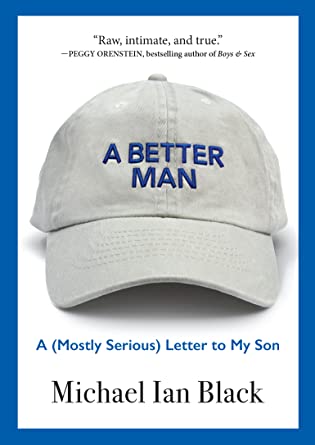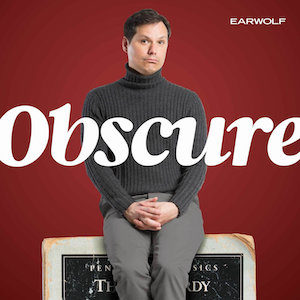I received this book for free from in exchange for an honest review. This does not affect my opinion of the book or the content of my review.
 A Better Man: A (Mostly Serious) Letter to My Son by Michael Ian Black
A Better Man: A (Mostly Serious) Letter to My Son by Michael Ian Black Published by Algonquin Books on September 15, 2020
Genres: Memoir, Nonfiction
Pages: 304
Format: Hardcover
Buy on Amazon
Goodreads

“Raw, intimate, and true . . . A Better Man cracked me wide open, and it’s a template for the conversation we need to be having with our boys.” —Peggy Orenstein, bestselling author of Boys & Sex
A poignant look at boyhood, in the form of a heartfelt letter from comedian Michael Ian Black to his teenage son before he leaves for college, and a radical plea for rethinking masculinity and teaching young men to give and receive love.
In a world in which the word masculinity now often goes hand in hand with toxic, comedian, actor, and father Michael Ian Black offers up a way forward for boys, men, and anyone who loves them. Part memoir, part advice book, and written as a heartfelt letter to his college-bound son, A Better Man reveals Black’s own complicated relationship with his father, explores the damage and rising violence caused by the expectations placed on boys to “man up,” and searches for the best way to help young men be part of the solution, not the problem. “If we cannot allow ourselves vulnerability,” he writes, “how are we supposed to experience wonder, fear, tenderness?”
Honest, funny, and hopeful, Black skillfully navigates the complex gender issues of our time and delivers a poignant answer to an urgent question: How can we be, and raise, better men?
This is an important book for our current moment. I found it helpful to understand the messages men receive about how to be “correctly” masculine, and I think we can lay many of our current societal problems at the feet of these dangerous messages. Readers looking for Black’s characteristic humor will find the subtitle accurate: the book is mostly serious, and I really appreciated the vulnerability and honesty of its seriousness. The book serves as a contemplative memoir, a poignant letter of love and advice, and a meditation on our world. I walked away from it feeling that Michael Ian Black is a good husband, father, and most of all, a good man.
I recommend this book most highly to men, but I learned a great deal from it, too. Most importantly, it gave me an understanding. I don’t believe all men are alike, and I don’t believe they are all horrible, but I freely admit I was reaching a point of despair over the ability of men—White men—to recognize their privilege and work on unlearning some of the most damaging messages they have received. If I had to pick a moment when this feeling started to take shape, it was when Justice Kavanaugh was confirmed. I recognized that man. I am pretty sure I went to high school and college with a lot of guys like him. And I was pretty sure Christine Blasey Ford was telling the truth. I was also pretty sure that Kavanaugh thought he was telling the truth, too. That might seem like a strange thing to say, but I think he felt entitled to do as he pleased, and I think he felt pressured to prove his masculinity through sexual conquest, and I think a lot of the boys in his friend group were doing the same things, which normalized and maybe even celebrated treating women as less than people, only useful as sexual objects. Because I remember what it was like to be a girl in the era in which Kavanaugh allegedly raped Blasey Ford. Black devotes a whole chapter to consent, and he explains the messages both girls and boys receive about consent and how they warp our ability to communicate sexual desire.
I admit things seem hopeless right now. We have a racist, misogynist person in the White House. He operates out of the most toxic and dangerous aspects of masculinity. Our civil rights champion, Supreme Court Justice Ruth Bader Ginsburg died yesterday. We are in the midst of a global pandemic that has completely upended our lives and taken the lives of a number most of us can’t fathom. The ending isn’t in sight. We are in the darkest part of the tunnel, or maybe the belly of the whale, and it is hard not to be resigned to despair. This book gave me a little bit of hope. It’s going to take some backbreaking work, but I’m comforted to know people like Michael Ian Black are doing their part for us.

